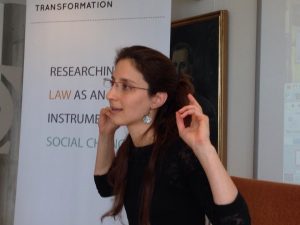Andrea Castagnola is an assistant professor at the School of Politics and Government at Universidad Nacional de San Martin, Argentina. In her new book “Manipulating Courts in New Democracies: Forcing Judges off the Bench in Argentina”, the main questions are: When can the Executive manipulate the composition of a Court? What political factors explain judicial instability on the bench?
Q: First of all, congratulations on your new book!
Q: You have previously looked at manipulation in higher courts in Latin America in a historic perspective, while now you look into the case of Argentina today. What is the background for your new research in this country-specific case?
A: This project started before the Latin American study but it took me more time than expected to finish it. In fact, the Latin American project originated as a continuation of the case study. The difference between both projects is that the Argentine study presents more qualitative evidence than the regional study, and, thus aims to present in greater detail the microfoundation of the executive manipulation of high courts in the country
Q: Your previous research has looked into a long history of corruption and manipulation in the entire region of Latin America. Do you believe there are similar cases of manipulation of higher courts in other Latin American countries today, or does Argentina stand out in any way? Why did you choose to focus on Argentina?
A: There are different patterns of political manipulation in the region and Argentina represents one of those tracks. The Argentina case shows how presidents can manipulate the composition of the courts while other countries in the region, like Ecuador, represent how Congress can manipulate Courts. My book also analysis judicial manipulation at the subnational level, thus Argentina represents a good case.
Q: In your newest research, “Manipulating Courts in New Democracies: Forcing Judges off the Bench in Argentina”, you argue that in developing democracies the political benefits of manipulating the court outweigh the costs associated with doing so. Why is that?
A: This argument goes in line with what other scholars, like Maria Popova, have argued. The logic is that in emerging democracies politicians have stronger incentives to manipulate the judiciary because the cost of doing so is lower while the benefit is higher. On the one hand, low political costs are associated with two main factors. First, politicians have informal ways of manipulating justices that do not necessary catch the attention of the media or citizens, and, second, there is no fearful political backlash in those actions either because citizens are more accustomed to those political interference or because there is no much information in the media due to a lack of freedom of the press. On the other hand, the benefits for politicians of having a subservient court are straightforward: strengthen their policies, guarantee their reelection and receive protection from selective prosecution, among others
Q: You demonstrate that there are various institutional and non-institutional mechanisms for induced retirement which politicians have used against justices, regardless of the amount of support their party has in Congress. Why is this so?
A: The political manipulation of courts that started in Argentina in 1947 with the massive impeachment to the members of the Supreme Court is common practice that follows a path dependence self-reinforcing process that motivated presidents to craft friendly courts regardless of their partisan power. One interesting finding from the qualitative evidence is that during the last decades this path dependence process has recently started to exhibit changes in its tactics and pace, it takes more time to Presidents to craft friendly courts.
Q: What are your next plans? Do you have a new research project in mind or is there anything else you would like to mention?
A: Currently I am working on a study about judicial behaviour of the Constitutional Chamber of the Supreme Court in Paraguay. With a local research team in Asuncion we are coding how justices voted on those cases and we are trying to explore whether justices behave strategic or not in a context of political instability and high intra party competition. Results would be available early 2019.

